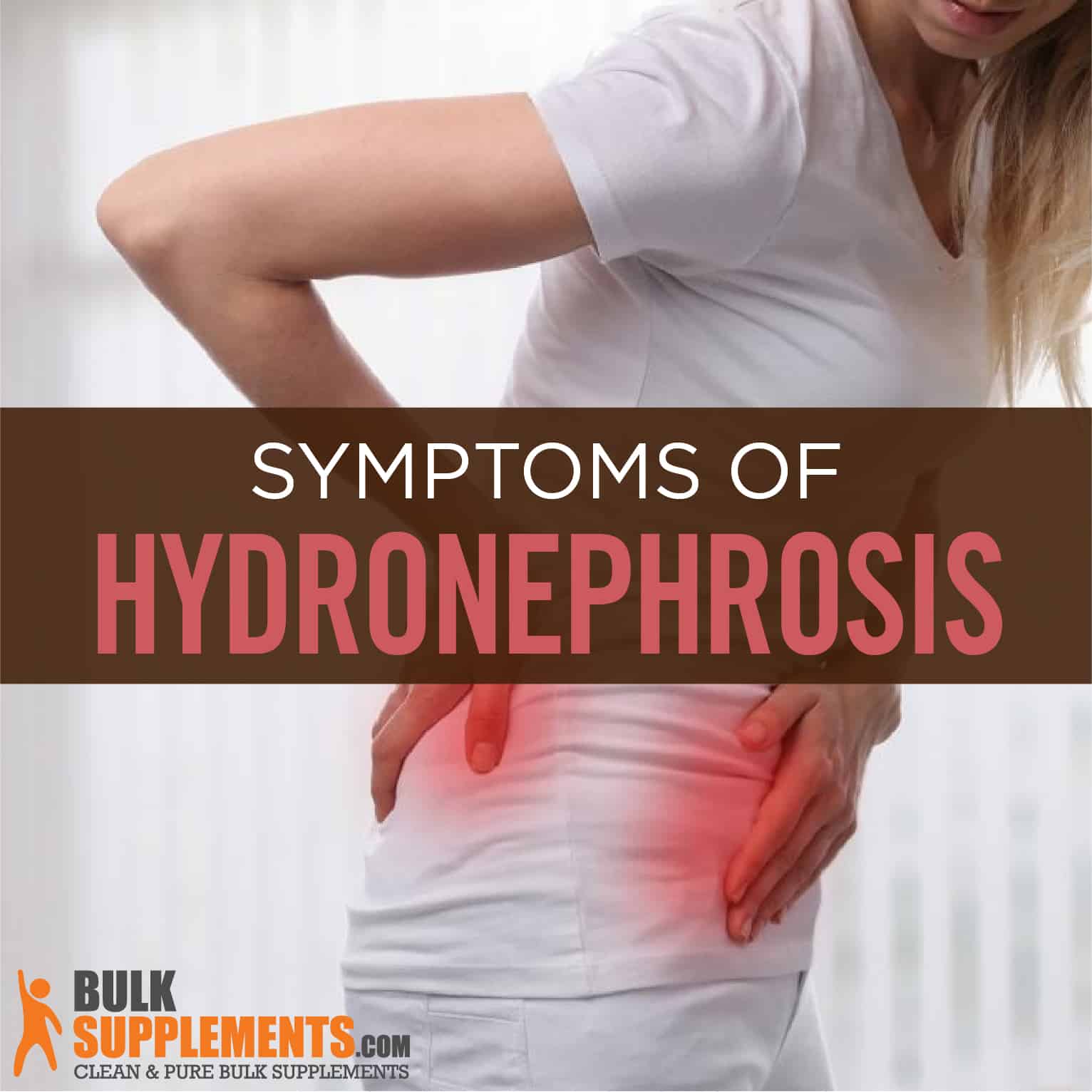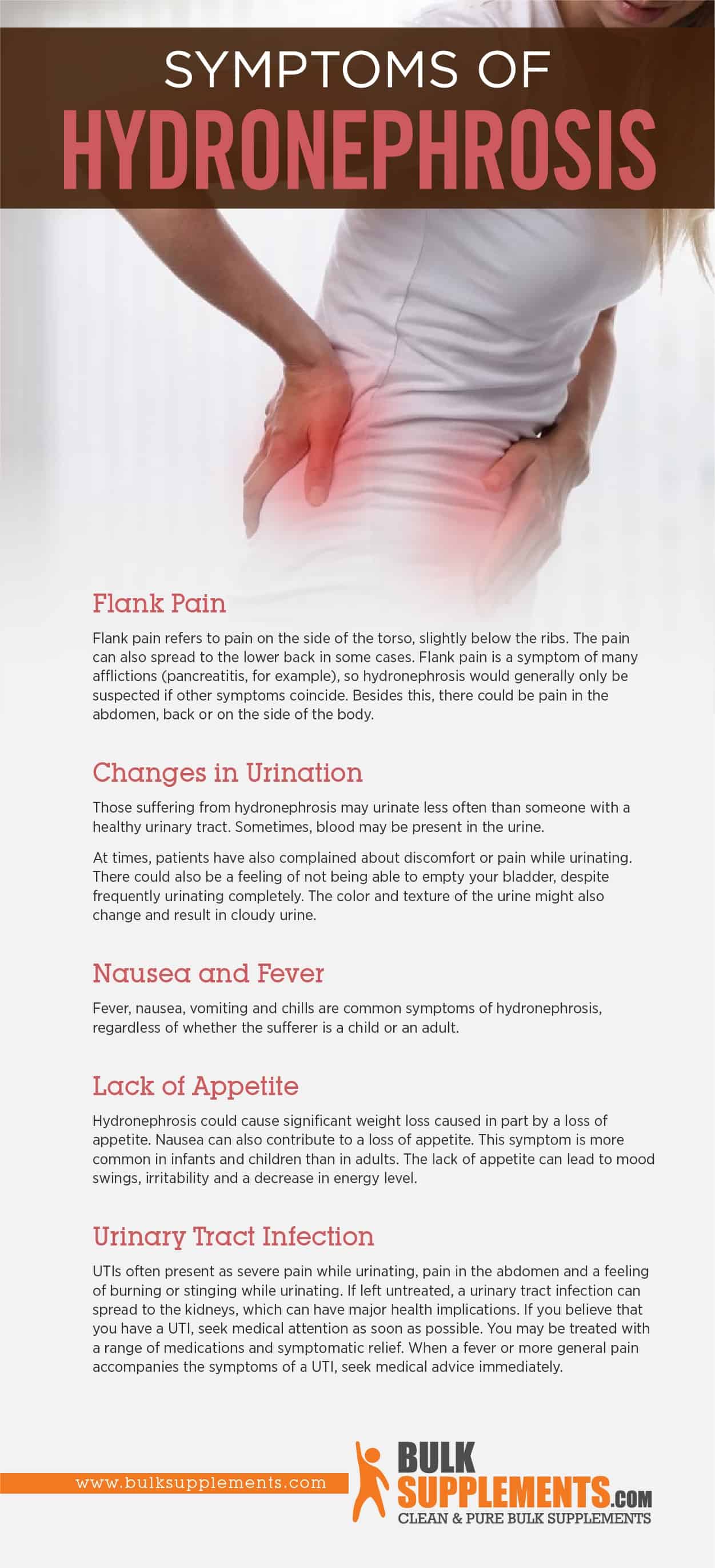Hydronephrosis: Symptoms, Causes & Treatment
by James Denlinger Digital Marketing Strategist
What is Hydronephrosis?
Hydronephrosis is a health condition that deals with the swelling of a kidney due to urine build-up. This usually occurs when urine is unable to empty from the kidney to the bladder. The reason for this could be some sort of a blockage. This condition can affect either one or both kidneys.
Hydronephrosis does not always show symptoms. Pain is among the most common symptoms with changes in urination frequency or color. Since the obstruction of the pathway places pressure on the kidneys, this could potentially damage the organ. The obstruction could either be inside or outside the urinary tract. These blockages can further lead to an enlarged prostate or occurrence of kidney stones.
Hydronephrosis Symptoms
Not everyone experiences the symptoms of hydronephrosis. However, most people will experience one or more of the following if they have a blockage to the kidney.
Flank Pain
Flank pain refers to pain on the side of the torso, slightly below the ribs. The pain can also spread to the lower back in some cases. Flank pain is a symptom of many afflictions (pancreatitis, for example), so hydronephrosis would generally only be suspected if other symptoms coincide. Besides this, there could be pain in the abdomen, back or on the side of the body.
Changes in Urination
Those suffering from hydronephrosis may urinate less often than someone with a healthy urinary tract. Sometimes, blood may be present in the urine.
At times, patients have also complained about discomfort or pain while urinating. There could also be a feeling of not being able to empty your bladder, despite frequently urinating completely. The color and texture of the urine might also change and result in cloudy urine.
Nausea and Fever
Fever, nausea, vomiting and chills are common symptoms of hydronephrosis, regardless of whether the sufferer is a child or an adult.
Lack of Appetite
Hydronephrosis could cause significant weight loss caused in part by a loss of appetite. Nausea can also contribute to a loss of appetite. This symptom is more common in infants and children than in adults. The lack of appetite can lead to mood swings, irritability and a decrease in energy level.
Urinary Tract Infection
UTIs often present as severe pain while urinating, pain in the abdomen and a feeling of burning or stinging while urinating. If left untreated, a urinary tract infection can spread to the kidneys, which can have major health implications. If you believe that you have a UTI, seek medical attention as soon as possible. You may be treated with a range of medications and symptomatic relief. When a fever or more general pain accompanies the symptoms of a UTI, seek medical advice immediately.

Causes of Hydronephrosis
Hydronephrosis typically develops when urine collects or gets left inside the kidney or the ureter (the duct by which urine passes from the kidney to the bladder) instead of passing clearly via the urinary tract. There are many things that could cause a blockage. Most commonly, however, the reason behind this is underlying, existing medical conditions.
Partial Blockage in the Urinary Tract
Urinary tract obstructions usually form in the place where the ureter and kidney meet — ureteropelvic junction. It may also be seen at the ureterovesical junction — the meeting point between the bladder and the ureter. Besides the urinary tract, blockages or obstructions anywhere in the kidney, the tube or the bladder that could stop the urine from flowing out will place pressure on the kidneys, leading to hydronephrosis.
Vesicoureteral Reflux
This occurs when urine’s flow is reversed and it flows back into the kidney. This could make it difficult for the kidney to empty, leading to swelling. Inflammation of the renal pelvis could also affect the smooth flow.
Pregnancy
Pregnancy, at times, can cause the womb to block the tubes linking the kidneys and the bladder, which is why experiencing hydronephrosis during pregnancy is relatively common.
Kidney Stones
If a stone moves out of the kidney via the tube and gets stuck, it could cause a blockage.
Cancer
There are a few kinds of cancer that are known to affect the urinary system. This includes prostate, bladder, kidney, cervical and ovarian cancers. A tumor pushing against any part of the tube or organ in the area could potentially affect and block the flow of urine from the kidneys.
Prostate Drainage
In certain scenarios, the patient might need to undergo a digital rectal exam where the doctor will try to drain the fluid in the renal pelvis.
Diagnosis
Hydronephrosis Ultrasound
Ultrasound is an imaging study that can be useful to help diagnose hydronephrosis. This non-invasive procedure lets the doctors understand more about your health and is used for screening.
Hydronephrosis Treatment
The treatment for hydronephrosis is usually decided after diagnosing and understanding the cause. While surgery might be necessary in certain cases, doctors also work with antibiotics to prevent infection and deal with pain. Generally speaking, the treatment is of the underlying cause, which in turn treats the hydronephrosis.
Mild to Moderate Hydronephrosis
In mild cases, your physician may choose to wait some time before deciding on a treatment. This is because hydronephrosis can also get resolved on its own without external interference. However, there is a chance that you still might be prescribed some antibiotics to reduce the risk of contracting a urinary tract infection.
Severe Hydronephrosis
In more severe cases, when the kidney doesn’t function properly or in situations involving reflux, doctors might decide to perform surgery. In such cases, the stored-up urine needs to be drained to ensure the kidney remains healthy. This can be done by using a nephrostomy tube.
Treatment During Pregnancy
When this condition is caused by pregnancy, there is no specific treatment necessary, unless complications arise. Generally, hydronephrosis gets resolved once the pregnancy period ends.
Hydronephrosis in Infants
In the case that hydronephrosis is diagnosed before birth and the condition is not severe, it is known to get better on its own. However, the baby might need to take some tests in the first few weeks to ensure there are no other issues. They may also be given some antibiotics since they are at more risk of contracting a UTI. Infants with severe hydronephrosis would require surgery called pyeloplasty.
Surgery
To fix the reflux or clear the reflux, surgery might be the only option at times. This could either be a minimally invasive procedure or not, depending on the situation.
Treating Residual Pain
Passing kidney stones can be an unpleasant and painful experience. However, in most cases, these stones don’t cause any damage. To deal with the pain, you will be prescribed some pain medication and instructions to drink lots of water.
Caution
In mild cases, the condition could be monitored without any treatment to see how it proceeds. With severe hydronephrosis, though, lack of treatment could lead to permanent kidney damage.
Hydronephrosis in Pregnancy
A prenatal ultrasound is usually enough to understand if the fetus has dilated kidneys or enlarged kidneys. Some women experience kidney pain during pregnancy. This could be due to kidney stones. If this condition is left untreated, the kidney stones may obstruct the ureters, which will make them narrower, placing additional stress on the kidneys.
The hydronephrosis could also be due to the issues that arise congenitally in a fetus or might be the physiologic response to pregnancy. Hydronephrosis in babies is treated according to the severity and the cause behind it. Renal agenesis is the term for babies born with only one kidney.
Supplements for Hydronephrosis
Alpha Lipoic Acid
As this supplement affects blood sugar, it is best that you speak with your doctor before adding it to your diet.
ALA is an antioxidant, and has benefits like lowering blood sugar and reducing inflammation. Take one dose of 600 mg twice a day.
Moringa
Moringa is rich in antioxidants and potentially offers a reduction in inflammation. Take one dose of 1,000 mg twice a day after discussion with your doctor.
(NAC) N-Acetyl Cysteine
NAC is an antioxidant and can prevent oxidative damage. As a supplement, take one dose of 600 mg, thrice a day.
Supplements for Kidney Health
There are many supplements that can help the overall health of the body and support normal function of the kidneys. Note that excessive levels of any supplement can put more strain on the kidneys. Discuss any supplementation routine with a medical professional.
Vitamin C
Vitamin C can help the body to function healthily, support the immune system and is generally safe to consume. However, take care with your dose as too much may damage the kidneys. Check with your doctor before adding this to your diet. Take one dose of 1,000 mg once a day.
Vitamin B
B complex vitamins may have a protective effect on the kidneys. As a supplement, take one dose of 100 mg once a day.
L-Carnitine
L-carnitine can help support a healthy liver and may actually contribute to protecting against liver disease. So while it may not directly help treat hydronephrosis, it can help the kidneys in other ways. Take one dose of 500 mg four times a day.
Other Remedies
Drink Water
Other remedies for hydronephrosis include having lots of water since it can dilute the urine and drain out the bacteria. If the condition impacts your infant, ensure they drink lots of fluids, such as juice and water. It is not advisable to consume anything containing caffeine or citrus.
Don’t Hold Urine In
It is best that you urinate every couple of hours and not try to hold it in as it could lead to more pain and discomfort.
Exercise and Eat Healthy
Fresh vegetables and fruits, nuts, coconut and legumes can help you stay active and healthy. Exercising without putting too much of a strain on yourself can also help you deal with hydronephrosis. Consume cruciferous veggies, melon, green vegetables, bananas, avocados and cocoa.
The Bottom Line
Hydronephrosis is a condition where the kidney(s) swells up due to the obstruction of the tube so that urine cannot pass through. Due to the blockage, the kidneys swell up as the amount of urine builds up. There are other causes of hydronephrosis as well. In mild cases, no treatment is necessary. However, the condition must be monitored by your doctor so that action can be taken as and when necessary. In more severe cases, your doctor might have to perform surgery. It is common in infants as well, diagnosed both before and after birth. Following a proper diet in addition to medicines and supplements can greatly help deal with this condition.
Sponsor Ads
Created on Mar 5th 2020 19:50. Viewed 511 times.



